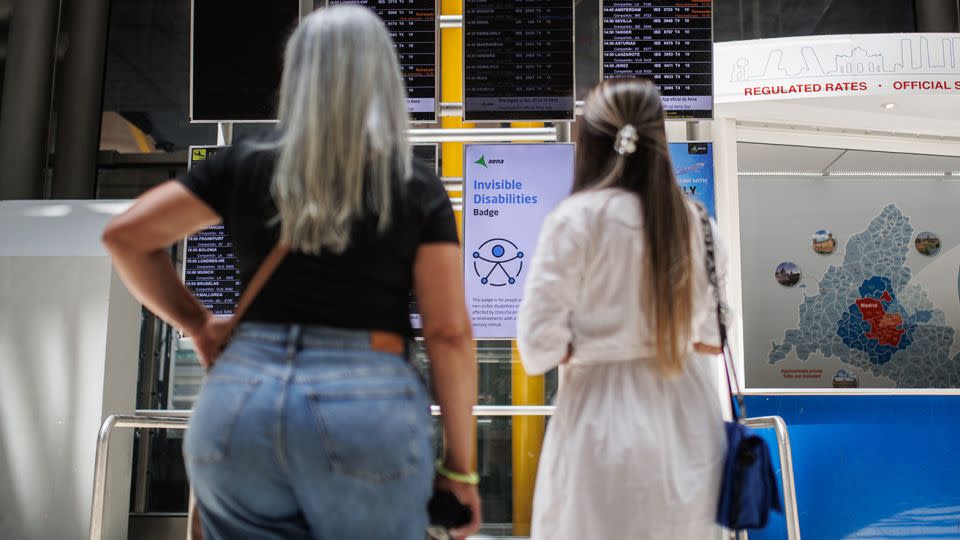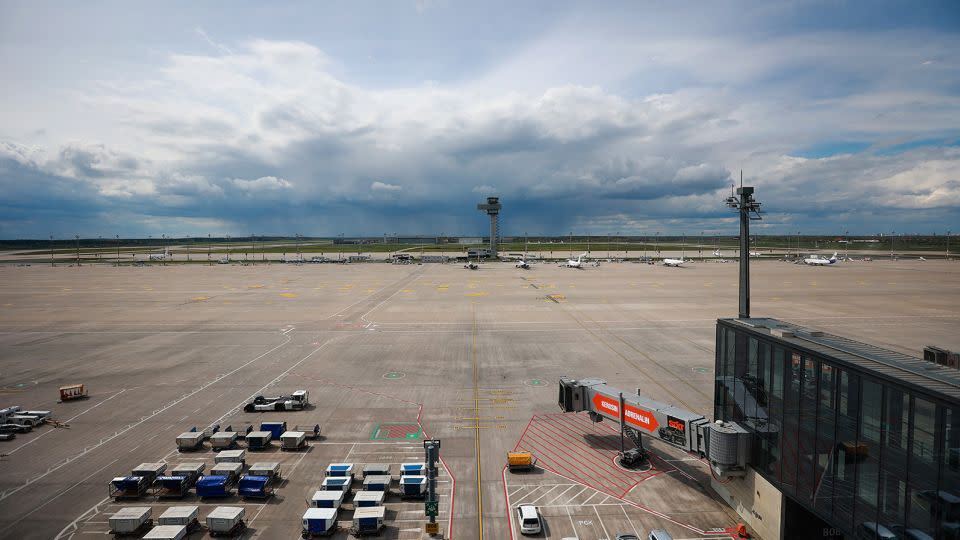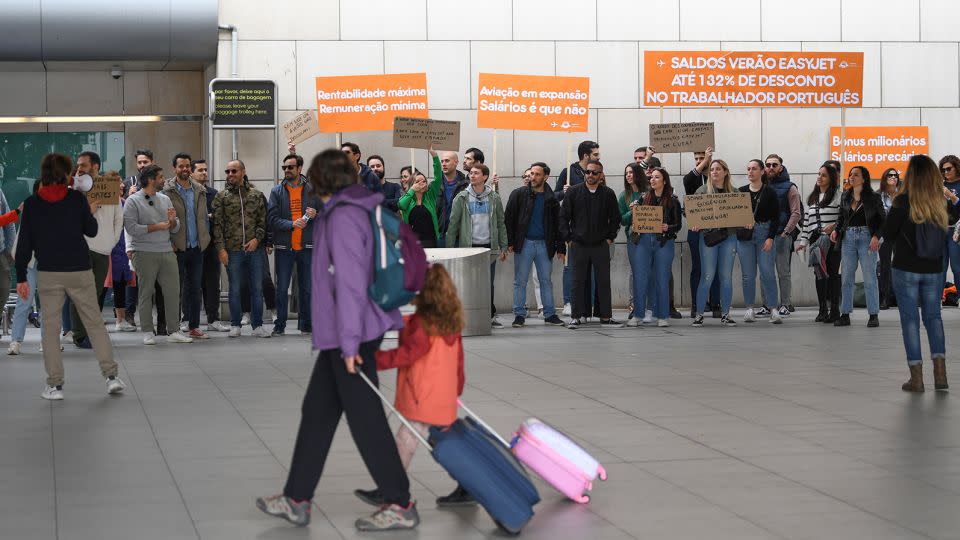It’s not just the heatwave. There’s now another reason your summer vacation might be ruined
Following last summer’s chaos of canceled flights, mountains of lost luggage and other disruptions, many airlines and airports ramped up staffing to meet unprecedented demand – and some have even billed this year’s peak travel season as a return to pre-pandemic normal.
But another hurdle currently looms large on the aviation landscape: strikes, which have already affected scores of passengers across Europe and are piling on the misery for vacationers also hit by soaring prices and scorching summer temperatures.
One of the most significant moves is possible industrial action from a trade union of civil servants in Eurocontrol, the organization that manages airspace across Europe.
Union Syndicale Bruxelles has given formal warning of strikes affecting Eurocontrol over the next six months. It’s not yet announced firm dates for possible action, but aviation insiders are keeping a close eye on the situation.
The summer already has seen a flurry of strikes by pilots, ground crew, security staff and other transit personnel that have impacted airports, airlines and railway providers across Europe.
British budget carrier easyJet scrapped 350 flights that were set to arrive in or depart from Portugal ahead of a five-day cabin staff strike scheduled for July 21-25, Reuters reported. Strikes have also taken place – or are planned – in France, Belgium, Spain and other popular tourist destinations in Europe, adding yet another complication for travelers across the continent.
“Capacities are improving again as airlines, airports and other travel companies have continued hiring massive amounts of people over the past 12 months to make sure that such a chaotic summer situation doesn’t happen again this year,” Jakob Wert, editor in chief of International Flight Network, a Germany-based aviation trade publication, tells CNN Travel.
“But of course now we’ve got a huge challenge with these potential strikes coming our way.”
Another ‘challenging’ summer for European airports

The travel sector in particular is currently experiencing a high level of strikes largely because of inflation, Wert explains. “Right now prices are higher than they’ve ever been,” he says. “It’s the most important time for unions to get improvements on pay for their members’ work.”
Air traffic control congestion also has been a problem area throughout Europe, leading some carriers to make pre-emptive moves to mitigate disruption. Citing ATC challenges, easyJet recently announced cancellations of 1,700 flights, primarily from its base at London Gatwick, from July through September.
A spokesperson for the carrier told CNN Travel it has already provided all affected passengers with the option to rebook or receive a refund, and 95% have been rebooked on an alternate flight.
Raúl Medina, director general of Eurocontrol, predicted such challenges in late June during the Airports Council International General Assembly in Barcelona. According to Aviation Week, Medina said the industry was better prepared this summer than a year ago, when significant delays and cancellations were largely caused by widespread labor shortages.
But Medina also warned of a “challenging” summer, with an estimated 33,000 flights per day during peak travel weeks; on Fridays, one of the most popular days to travel, that figure could top 34,000. In addition, he noted that Russia’s war in Ukraine adds another complication, as military activity in Europe has reduced the amount of available airspace by up to 20%.
Even considering such constraints, air traffic control as a whole has drawn strong criticism from the International Air Transport Association, which represents 300 member airlines.
In a July 12 statement released by IATA, Director General Willie Walsh described air traffic control performance in both Europe and the US as “disappointing,” adding that all European carriers have been subjected to a “challenging” ATC environment.
“Airlines and airports worked hard to ensure that sufficient resources would be provided to minimize disruptions and get travelers to where they need to be on time. Lack of ATC resources nationally – particularly in Germany and France are preventing that,” the statement said.
Walsh did note that some areas of ATC performance have improved over 2022 but described the overall situation as “unacceptably behind 2019 levels.”
Strategies for dealing with strikes

Passengers don’t have control over whether a strike will occur, but they can use some strategies to mitigate its impact on their travel plans, aviation experts say.
Wert advises travelers to remember that despite all the various entities that may be involved in a strike – airports, pilots or ground crew, for example – the airline they booked with should be the first point of contact for next steps.
“The airline at first is always responsible for the passenger, because the passenger has the contract with the airline,” he explains. “The passenger doesn’t have a contract with the airport operator or with the baggage handler or whatever.”
Passengers should also pay close attention to news reports and airline notifications about potential strike announcements – especially in a destination where they may not be as familiar with current events – and check the airline’s policy on strikes and rebooking.
Katka Lapelosova, a digital content and travel writer based in Belgrade, Serbia, says she’s “hyper-vigilant with news alerts” to monitor strikes that could affect her trips – like the one American Airlines pilots threatened this spring.
She also takes the extra step of asking airlines specifically about her rights as a passenger – especially what the compensation policy is – if a strike occurs. This is especially important in Europe, where different countries and their airlines have varying regulations around strikes.
“Each airline is different, so it’s important to get the information in writing as well,” explains Lapelosova, who says she’s reached out to Lufthansa, American Airlines and Wizz Air about strikes prior to trips over the last six months.
“This comes in handy if you’re at the airport and a strike affects you before you’ve had a chance to make changes from the comfort of your home. Come armed with the policy info you’ve gotten, then prepare to be patient, as info desks and airline customer service hotlines will be jammed for sure.”
Wert’s “first and most important recommendation” for passengers is to monitor any potential strike action before leaving for the airport, to avoid the added stress of rebooking a canceled flight from a crowded airport with hundreds of other frustrated passengers.
“There might also be cases where there’s a strike on a Friday and you’re flying on a Saturday, and your flight might still be affected,” he says. “So make sure to always get the information right from the airline right before going to the airport.”
And if travelers don’t yet have travel insurance, now is certainly the time to buy it – especially if they’re headed to Europe. Mark Chesnut, a New-York based travel journalist and author, says annual policies that cover multiple trips offer frequent flyers “peace of mind” without the hassle of having to buy insurance each time.
“But you can also buy insurance as a one-time add-on, of course, which can make more sense if you don’t travel as much,” Chesnut says.
But be sure to read the fine print, as “not all policies will help you if your travel is disrupted because of strikes,” advises Nicky Kelvin, UK editor at large of The Points Guy, a travel site specializing in points-based travel.
Kelvin, who says strike action “is likely to be the biggest risk to smooth travels this summer,” also recommends checking the credit card you used to pay for your airfare, as certain policies cover additional coverage for travel disruptions.
Finally, keep good documentation of the strike as well as receipts for all costs related to the ensuing delay or cancellation – and be sure to file claims early, which helps your chances of a successful claim, according to Anton Radchenko, founder of AirAdvisor, a claims management company.
‘Complexity is the name of the game’

Passengers who are especially concerned about the potential impact of a strike on a highly anticipated trip might want to consider booking through a travel agent or advisor, whose job it is to navigate these kinds of challenges.
It’s a precautionary move more travelers are making: A March 2023 survey by the American Society of Travel Advisors found more than half of consumers who responded said they were more willing to use a travel advisor than they were in the past – a 14% bump from last year’s survey.
In addition, 27% of approximately 1,000 participating member agencies said that over half of their clients are first-time users of travel advisors – presumably to handle the hassles caused by strikes and other travel disruptions that are increasingly commonplace.
“Complexity is the name of the game when it comes to the carriers, and that is something that we do very well as travel advisors – uncovering those complexities,” says Jay Ellenby, former ASTA chairman and president of Safe Harbors Business Travel, a Maryland-based travel agency.
“We make sure that either the clients are educated about it, or in some cases, they don’t see the complexities and we just (handle) it for them. They can call their travel advisor and we’re going to get the situation straightened out, probably within 15 minutes.”
But for those who don’t mind a DIY approach for rebooking and compensation, persistence is key – as well as knowing your rights as a passenger. In European Union countries, that includes a law called Regulation (EC) No 261/2004, also referred to as EU 261, that establishes specific rules on passenger assistance and compensation (between 250 and 600 euros per person – about $220-$530 – depending on flight distance) for delayed or canceled flights that take off or land in the EU or are operated by airlines licensed in the EU.
Depending on the circumstances of the strike, the law may or may not entitle a passenger to compensation. Even so, EU 261 is an excellent resource for travelers to be aware of, especially for trips to Europe.
But regardless of their destination, people should always know their rights in case of a strike or other disruption – and never be afraid to ask for compensation.
“It’s really important to do as much research and ask as many questions as possible,” Lapelosova says. “Airlines aren’t trying to trick people by withholding this information, but you likely won’t get anything unless you ask.”
For more CNN news and newsletters create an account at CNN.com
